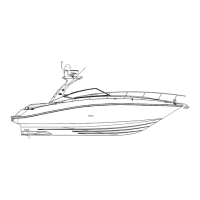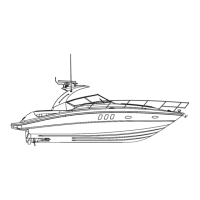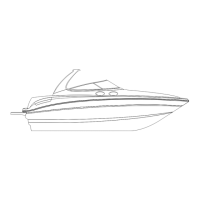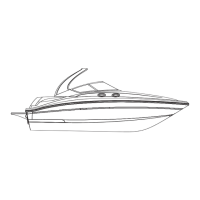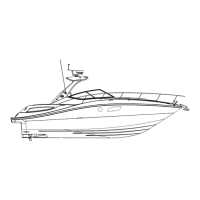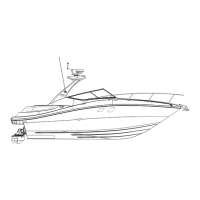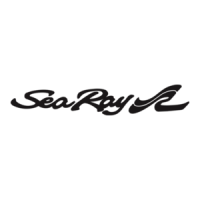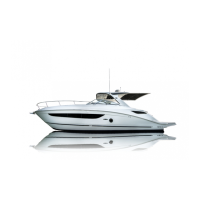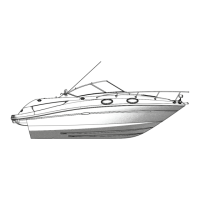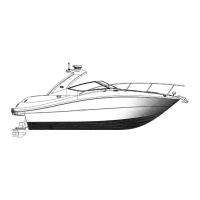Do you have a question about the Sea Ray Sundancer 350 and is the answer not in the manual?
Outlines the components of the Owner's Information Packet, including manuals and OEM information.
Explains the purpose and content of the owner's manual and packet.
Details the owner's responsibilities for safe operation and registration.
Explains safety symbols and precautions found throughout the manual and boat.
Lists resources for boating courses and general boating information.
Outlines duties of the dealer during pre-delivery and handover.
Describes the boat's warranties and where to find detailed information.
Explains the importance and location of the Hull Identification Number.
Details Sea Ray's compliance with safety acts and industry standards.
Advises on performing service and repairs through authorized dealers.
Mentions compliance with international standards for boats sold globally.
Directs users to warranty information within the manual and packet.
Discusses safe passenger placement and stability considerations on deck.
Details maximum load capacity and its importance for safety.
Explains the four design categories of boats based on seaworthiness.
Identifies the locations and meanings of safety labels on the boat.
Provides a guide to understanding various symbols used on controls and in diagrams.
Lists key dimensions and clearances for the boat's coupe version.
Provides key dimensions and clearances for the boat's hardtop version.
Identifies through-hull fittings on the starboard, port, and transom sections of the boat.
Illustrates the layout of controls and instruments at the helm station.
Shows the layout of various features and amenities on the main deck.
Identifies components and features located on the hardtop of the boat.
Depicts the layout of the boat's interior cabin, including sleeping and living areas.
Shows the location of deck lighting fixtures on the boat.
Identifies deck-mounted switches and receptacles, including 12 VDC and GFCI outlets.
Explains the proper use of cleats, lifting procedures, and boat storage considerations.
Details the layout of navigation and anchor lights on the boat.
Describes the console dimmer switch for panel and compass lights.
Provides a warning regarding bilge blower and ventilation intake obstructions.
Covers engine maintenance, warranty, propulsion systems including stern drive and V-drive.
Explains the operation of the joystick control for maneuvering and docking.
Describes the engine exhaust system, water mixing, and drain plugs.
Covers fuel quality, tank capacity, gasoline system, and fuel tank vents.
Describes the freshwater system, including tank, pump, heater, and distribution manifold.
Shows the layout of the gray water system, including holding tank and sump.
Illustrates the drainage system layout, showing various drains and pumps.
Covers waste system requirements, macerator operation, and discharge options.
Explains the automatic fire extinguisher system, indicator lights, and manual operation.
Details the carbon monoxide monitor, its function, testing, and End of Life signal.
Describes the SmartCraft™ system for monitoring boat operational information.
Explains the AC/heating system, filter maintenance, and startup procedure.
Explains the 12-volt DC electrical system and its power sources.
Details battery types, recommendations, ratings, and safety precautions.
Emphasizes ignition protection for engine compartment components to prevent sparks.
Explains the function of the battery switch for isolating power and safety.
Describes how the ACR automatically combines batteries for charging.
Explains how DC power is distributed from batteries to panels and devices.
Details the function and types of fuses and breakers for circuit protection.
Explains the AC electrical system wiring and safety precautions.
Describes how to connect and turn on shore power, including panel layout.
Outlines the steps for safely starting the generator.
Explains how to switch the boat's power source from shore to generator.
Describes the procedure for safely shutting down the generator.
Explains the automatic battery charging unit and its function.
Describes the 120V AC inverter, its power capabilities, and operation.
Explains GFI receptacles and their safety function against shock hazards.
Details the GFI outlet, its function, and limitations.
Discusses corrosion prevention, anode plates, and inspection requirements.
States that the manual contains electrical schematics and recommends dealer service.
Provides a wiring schematic for the boat's DC electrical system.
Continues the DC wiring schematic, detailing various component connections.
Continues the DC wiring schematic, showing harness and component connections.
Continues the DC wiring schematic, illustrating more component and harness connections.
Continues the DC wiring schematic, showing blower and generator connections.
Continues the DC wiring schematic, detailing various harness and component connections.
Continues the DC wiring schematic, showing hardtop and cockpit lighting connections.
Continues the DC wiring schematic, detailing stereo and cabin lighting connections.
Continues the DC wiring schematic, showing panel and indicator connections.
Continues the DC wiring schematic, detailing cabin lighting and speaker connections.
Continues the DC wiring schematic, showing stereo and speaker connections.
Completes the DC wiring schematic, showing various system connections.
Provides reference to pages detailing AC system layout.
Directs to pages covering battery information and maintenance.
Points to pages showing the interior cabin layout.
Directs to pages explaining the DC electrical system.
Refers to pages detailing the deck layout.
Points to pages covering the boat's AC and DC electrical systems.
Directs to pages discussing engine and propulsion systems.
Guides to pages on the fire extinguishing system.
Refers to pages detailing the freshwater system.
Points to pages explaining the boat's fuel system.
Directs to pages on generator operation.
Refers to pages showing the hardtop layout.
Guides to information on the Hull Identification Number.
Points to pages discussing ignition protection requirements.
Refers to pages explaining the inverter's function.
Directs to pages on joystick control system operation.
Points to pages detailing lighting layouts.
Refers to pages discussing the macerator system.
Directs to pages showing safety label locations.
Guides to pages on shore power connection and operation.
Refers to pages with boat specifications and dimensions.
Points to pages detailing switch and receptacle layouts.
Refers to pages explaining control symbols.
Guides to pages on through-hull fitting locations.
Directs to pages discussing the V-drive system.
Points to pages with warranty information.
Refers to pages detailing the waste system.
Guides to pages on the water system.
Directs to pages on safety precautions.
Refers to pages detailing safety and warning labels.
Points to pages discussing the SmartCraft™ system.
Guides to pages on through-hull fitting locations.
Refers to pages detailing the waste system.
| Overall Length | 35' 0" |
|---|---|
| Length Overall | 35' 0" |
| Draft | 3' 0" |
| Dry Weight | 14, 500 lbs |
| Fuel Capacity | 250 gal |
| Water Capacity | 50 gal |
| Holding Tank Capacity | 40 gal |
| Deadrise | 21° |
| Sleeping Capacity | 6 |
| Engine Options | Twin MerCruiser 6.2L MPI (300 HP each) |
